Every Man Will Do His Duty Read online
Page 29
On the 10th of March, by 11 o’clock in the morning, the Childers was under sail, favoured with a good breeze and fine weather. So soon as we were clear of the land I exercised the seamen at the guns and the sword exercise. The boats were also put into good order, with a certain number of men fixed upon ready for boarding ships at anchor. I explained to the crew my determination to be constantly ready for action, by night or by day, directing them to keep their cutlasses and pistols in fighting condition. The next day I boarded a whaler bound to Davis Straits, but nothing of consequence occurred till the 14th when we made the land, and I saw the coast of Norway, of stupendous height, for the first time. I had suited my dress for sea service in a small vessel—a round jacket, etc. When exercising the seamen at the guns and the Marines with muskets, I appeared on deck with my sabre drawn and pistols in my belt. This proceeding seemed to be approved of by all under my command, as I noticed cheerful countenances in every direction. My orders were obeyed with alacrity and apparent good will. All these indications gave me confidence, which led me to rely on their support in the event of meeting an enemy.
It was about 1 o’clock of this day that a vessel was seen from the mast head. Sail was instantly made in chace of her. The stranger closed in with the land, by which means we lost sight of her. My dinner hour was ½past 2 P.M. By ½past 4 we had closed this mountainous coast and again got sight of the chace. We were now in smoother water, but the stranger disappeared among the rocks. Not thinking it prudent to stand too near to this high land, I hoisted out the cutter. Volunteers offered themselves with an animated spirit that was truly gratifying. A certain number having been selected, I gave the command of her to the master, Mr. Wilson,28 directing him to proceed inshore and bring out the vessel. He had no sooner left the brig when more volunteers came forward, anxious to assist the cutter. Not wishing to thwart their bold intentions, I had the jolly boat lowered and soon manned, the purser29 requesting to lead her. He evinced such determination that I complied with his wishes. All this time my dinner remained on the table. I had been so often interrupted during the chace that I had not finished the necessary meal. The two boats that had gone away contained 24 of my best men. They were soon out of sight, and the Childers lay to, waiting the result of their exertions.
More than an hour elapsed, and no boats were to be seen. I became anxious, as the day was closing: and this feeling was considerably increased when the man aloft on the look-out, shouted in a loud voice, “A large vessel coming towards us from under the land!” All our attentions were instantly directed to the object. Opposite to that part of the coast where I had hove to, the land trended to the north east. A long inlet extending to some distance was discerned, which the pilots informed me led to the port of Hitteroe. It was from thence that this stranger was approaching under topgallant sails. The two lusty pilots gave symptoms of extreme alarm, declaring that the enemy’s vessel was a very powerful one, and that I should either be taken or sunk. I desired them to keep silence and attend to my orders: but they became so refractory that I was obliged to order them below, as their sayings made a strong impression upon the seamen.30 I then called the crew to their guns and prepared for action.
As the stranger drew out from his apparently confined inclosure, he was still end on, and I could not see his rig. But the size of his bows indicated a vessel of some dimensions. Then, as he shaped his course towards the Childers, we saw the length of his hull: he was a large brig,31 mounting nine long heavy guns upon his broadside. This was not a very agreeable visitor, and I now found myself in a most awkward position. The boats had not yet hove in sight from the NW—that is, on my right—and I was, I confess, almost at a loss how to act. If I attempted to draw further off from the land, I exposed my boats to capture. Therefore, after a few seconds of meditation, I determined to bring my opponent to action. He continued to near me, and when he was about a mile off upon my starboard bow, I fired a shot at him. At the same time up went the colours of Old England. My firing obliged him to alter his course: therefore, instead of closing nearer, he hauled off. This was a most critical moment for me. When he changed his plan, which at first seemed to be one of attack, he hoisted the Danish ensign and kept aloof, whereby the advantage instantly turned in my favour: which had its effect on my crew. Fortunately for me, I had now time to make my arrangements.
But before I could make sail, to bring the enemy to action, my boats hove in sight, coming from a deep creek on our left, with a galliot in tow, under sail. Its crew, not being armed, had been unable to resist the attack of my boats, but had fled on shore, where they hurled down from the rocks huge stones. But fortunately no one had been injured by them. My crew were firing their muskets, and a similar fire was noticed from the prize, which circumstance led me to believe that my men were still contending with the Danes. However, the firing soon ceased, and the boats neared us rapidly. Yet notwithstanding these favourable appearances I was still in a very embarrassed position, because it lay in the power of the enemy to capture my boats and retake the galliot. Why the Dane did not make that exertion is no affair of mine. By his not doing so, my boats finally rejoined me, my opponent looking quietly on all the while. I now gave directions for the security of the prize, placing an officer in command of her. The boats were hoisted in, and I made sail to attack the Dane.
The day had just closed. I had therefore to beat to windward to reach him. He kept so close to the land that I could not get inshore of him. My broadsides were directed only as often as they could bear, I was obliged to shorten sail, and I could only aim at him as the flash of his guns indicated his position. Darkness now came on, which for a short while interrupted our fire. Many broadsides had been exchanged, but as yet the Childers had not received any injury of consequence. There was only a light air so close to the high land, and the water was as smooth as a millpond. Under these circumstances all the advantages lay with the enemy. He could see us as we were outside, but we could not see him. I therefore ceased cannonading till the moon enabled us to see what we were about. It was during this interval that we heard sounds very similar to the rowing of boats, and an impression naturally arose that the enemy was receiving men from the shore. Our quietness did not last long, for the Dane, profiting by his position, opened his fire in slow succession. One of his shots went clean through both sides of the Childers just above the line of flotation. Another shot lodged in the lower deck. It weighed 22 lbs. English, so that I was led to believe that he had long 18 lbers.—overwhelming odds against 12 lb. carronades. The moon at last, being at its full, shone forth in all imaginable splendour. Being now enabled to ascertain my exact position, I thought myself rather too near the land, upon an hostile coast. Judging it imprudent to expose my vessel to such unusual dangers, I directed the pilots to widen our distance, and, having placed her about three miles from the shore, I again hove to, waiting the proceedings of the Dane.
The heavens were cloudless; the stars and planets were seen in all their brilliancy. The enemy set his square mainsail, and, shaping a diagonal course, gradually increasing his distance from the land, he neared us. I was on the watch for a favourable moment to tack. I now ascertained that all the captains of the guns were on board the prize, which, in a certain way, was a loss. At about 11 o’clock I thought I had obtained the object I had been endeavouring to realise. I instantly set the courses and tacked the Childers. When round, I had the enemy on the lee bow. I then made a short speech to my crew, telling them that I meant to lay him on board on the weather bow and that they were all to follow me. They instantly armed themselves and patiently waited for orders. My clerk attended me carrying my sword. We were favoured with one of the finest nights I ever beheld. Every object could be seen as plainly as by daylight.
We stood on towards our opponent, and for a time all my plans bore the appearance of success. But, at the critical moment of weathering the Dane, the wind headed us two or three points. He, taking advantage of that circumstance, luffed up as close as he could, and my expectations
were foiled. Instead of gaining the wind I was obliged to bear up to prevent the jib booms of the two vessels coming in contact with each other, and pass along to leeward, as near as it could be done without touching the enemy, myself directing the motions of the man at the helm.
When the two jib booms were clear of each other, I ran forward to ascertain that the steersman was acting properly. Then we poured a broadside of round and grape shot into the enemy’s deck. His vessel leaning over into the wind, not one of the shot, I imagine, failed of doing mischief, and the groans of his men were distinctly heard. Then, coming aft and still directing the man at the helm, I had reached the lee side of the capstan when I was hurled down by it with such violence that I felt as if life had departed. My left arm was jammed against the edge of the lee carronade slide and my body smothered underneath the capstan. I lay in that position a few seconds till the smoke cleared away, when, my person being missed by the first lieutenant, he set to work to ascertain what had become of me. When he discovered my helpless position, with the assistance of some of the seamen he lugged me out from under the capstan, and as they were raising me from the deck my senses returned. The first words I heard were, “The captain is killed!,” repeated several times. Moving my arms and opening my eyes contradicted that assertion. My clerk had received a shot in the body which killed him outright, and I was covered with his gore. Altogether I was in a shocking plight, suffering great pain in both my legs and left arm. Having been removed to the weather side, I was seated on one of the carronade slides. At that moment the Dane fired two stern guns, but they missed us. I now ordered the first lieutenant to tack and lay the enemy on board on the weather quarter, but whilst he was preparing to do so the gunner called out from below that the magazine was afloat and the brig sinking. This report was confirmed by the carpenter.32 Consequently, renewing the action was out of the question. The enemy widened his distance by keeping on the opposite tack, and all that I could do was to close with the prize to save my crew. The enemy’s last broadside killed two and wounded nine, including myself, severely33 When the surgeon, Mr. Allen,34 came to my relief, I desired him to dress the wounded men first of all, then return to me. In the meantime he sent me some wine and water. When we got near the galliot we hove to. The pumps were at work and the dead were committed to the deep. Meanwhile, the Dane, standing on on the same tack, closed in with the land and we soon lost sight of him. This brought on 2 o’clock of the morning. The jolly boat was lowered, to communicate with the Prize and then to examine the damages sustained by the enemy’s fire. There were eight shot between wind and water on the starboard side, seven of which penetrated the hull.
The surgeon, having dressed all the wounded, repaired to me again. I was taken down to my cabin, which I found in a wretched condition. My steward had not removed a single article from the table on which my dinner had been laid. Most of them had been smashed to atoms. I had not returned to my cabin from the moment I left it to direct the motions of the Childers, about 4 o’clock in the afternoon. It was afloat, and the prospect was anything but agreeable. The Surgeon found my left leg most severely contused. The right one was cut open from the knee, down the bone to the ankle, by a splinter. Had it penetrated the thickness of a wafer deeper, the bone would have been broken to pieces. My left wrist was bleeding freely and the arm below the shoulder in acute pain. Whilst he was dressing me, the first lieutenant came to report that one of the pumps was choked and the brig sinking. “Well,” said I, “if that is the case I cannot help you. We must all go down together. Give me your hand, and God bless you. I have done my duty and am resigned to my fate.” Whether the cool and determined manner in which I delivered these words had any effect upon the lieutenant, I know not. But he hastened on deck and in the course of a quarter of an hour returned to acquaint me that the pump had been set to rights and that there was a chance of saving the Childers. At that moment the water in my cabin was about six inches deep, and as clear as the sea without. The surgeon quitted me, and I attempted to get some sleep.
After a few hours the surgeon renewed his visit, and reported favourably. He expected from the severity of the contusions that an inflammation would ensue. Fortunately for me that was not the case, but he entreated me to remain quiet. The report of the injuries we had received in the action was now laid before me. Both the lower masts were struck by shot, also the bowsprit. The rigging and sails were very much cut, and several shots had struck the hull. However, by the afternoon of the 15th the damages were repaired, and the shot holes under water stopped, so that we were able to shape a course for Leith Roads. The action had lasted, with intervals, upwards of seven hours against an enemy of vastly superior force. Twenty guns were counted plainly on his deck—that is, twenty on the sides and two in the stern. When I reflected upon the conduct of the enemy, he appeared, during the whole proceeding, to have been deficient in energy, as I always attacked him. He had the advantage of the weather gage, and might at his convenience have closed upon me. But instead of doing so he allowed me to bring him to action, waiting very quietly the result. Had he, when I attempted to cross his bow from the leeward, borne down upon me, the consequences might have been most fatal to the Childers. I have often thought of it. His vessel, being of considerably more burden than mine, when coming in contact would probably have overpowered her, and she would have gone down. After I had poured my last broadside into him, he never altered his course, but permitted me to close with the prize and make all my arrangements without annoyance. Consequently, I beat off an enemy after a very severe contest of long duration, and bore away in triumph the vessel which he evidently intended to recapture.
In the afternoon I directed the galliot to be taken in tow. She was called the Christina, and had only a part of her cargo in—45 casks of fish, some iron and other materials. She did not sail well: she was accordingly taken under our stern. The damages inflicted upon my property were very serious. Three trunks containing my wearing apparel were shot through; my writing case—a very handsome one—shattered to pieces. A small pocket book containing £25 in bank notes was never recovered, but my purse with 11 guineas in it was brought to me, as well a diamond pin. Altogether my losses by the engagement could not easily be replaced. The next day I was carried on deck to breathe some fresh air. As we were proceeding towards the coast of Scotland, we passed the convoy which I had taken charge of at Leith but afterwards delivered over to the Snake. We exchanged the private signal with that ship. Her captain would not be liable to any annoyance from the Dane that I had engaged.
On the 18th we anchored in Leith Roads. I had dictated to the purser my official report of the action as I was in too much pain to write. When he had completed it, I sent for the officers that they might hear the statement of our proceedings. They appeared not satisfied with it, saying that I had not done myself justice, as the action was one of the hardest fought of the war, the odds being immense and that I had not sufficiently explained the enemy’s vast superiority. The officers and crew repeated over and over again that the late captain never would have done anything of the kind. He would not have gone so close inshore. My only reply was that I preferred underrating the action to making a boasting report. The truth would soon be known and our exertions would be appreciated accordingly.
Not long after the Childers had anchored, in the forenoon, I was carried on shore and took up my quarters at the Britannia Inn on the pier of Leith, on the second floor, that I might be out of the way of all interruption. On my leaving the Childers, the crew gave me three hearty cheers.
My principal anxiety, now, was to learn what light my action would be viewed in by the Admiralty. The next was to recover the use of my limbs. I could not walk without crutches and my left arm was nearly useless. The following day the admiral called to see me. As I was in acute pain, he did not stay long, merely asking a few questions as to the state of the weather and the number of hours the action lasted. He then withdrew. So soon as the public became acquainted with the particulars of this engage
ment, all sorts of reports were in circulation—among others that the vessel I had fought was not a man of war but a privateer. Many officers of the Navy called. One in particular passed some very appropriate compliments upon my exertions, assuring me that I should receive promotion. “You command,” said he, “the very worst craft in the Navy, and you have fought a vessel of vastly superior force, bringing away a prize. You are entitled to reward, and I am sure the Admiralty will place that construction upon your conduct. Promotion will be the result.” I differed with him on that part relating to my advancement, as I had not captured the enemy, and told him so. “Well,” he replied, “recollect what I tell you. You have performed wonders under the circumstances, and you will be noticed accordingly.”
The reports to which I here allude no doubt made some impression upon Ad. Vashon as in two or three days he called again, and appeared in very ill temper. He overloaded me with questions and found fault with my report of the injury done to the rigging: in short, seemed inclined not to believe any of my statements, and refused to approve of my demand for the proper quantities of rope to replace those which had been shot away, unless I altered it. This was one of the most unpleasant official interviews I ever had in my life. I submitted patiently to all he said. I was in pain, suffering from the wounds, and therefore allowed him, without making any replies, to settle the fate of the Childers as he thought proper. Among other questions, he demanded in peremptory tones, “How do you know that your enemy had long 18 lbers.? The prize you have taken is not worth two pence.” I told him that I saw, and very nearly touched, the guns, that the shot on board weighed 22 lbs. English, and that I would send him one. After he took his leave, I directed that one of them should be sent to his house.

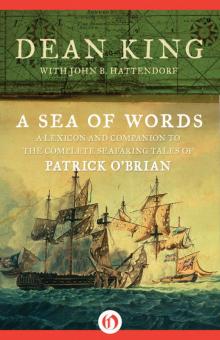 A Sea of Words
A Sea of Words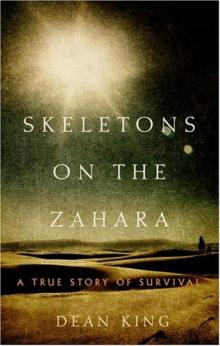 Skeletons on the Zahara
Skeletons on the Zahara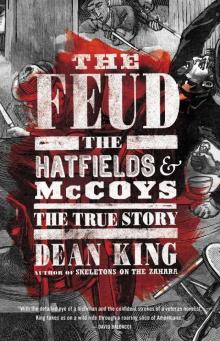 The Feud: The Hatfields and McCoys: The True Story
The Feud: The Hatfields and McCoys: The True Story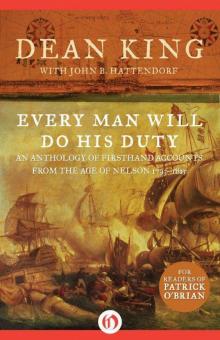 Every Man Will Do His Duty
Every Man Will Do His Duty 9/11...The Tragic Story of the Day that Changed America: The Terror, The Horror and The Heroes
9/11...The Tragic Story of the Day that Changed America: The Terror, The Horror and The Heroes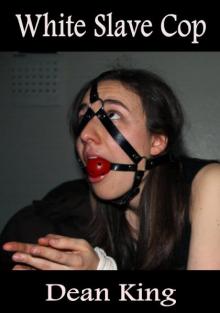 White Slave Cop
White Slave Cop Skeletons on the Zahara: A True Story of Survival
Skeletons on the Zahara: A True Story of Survival